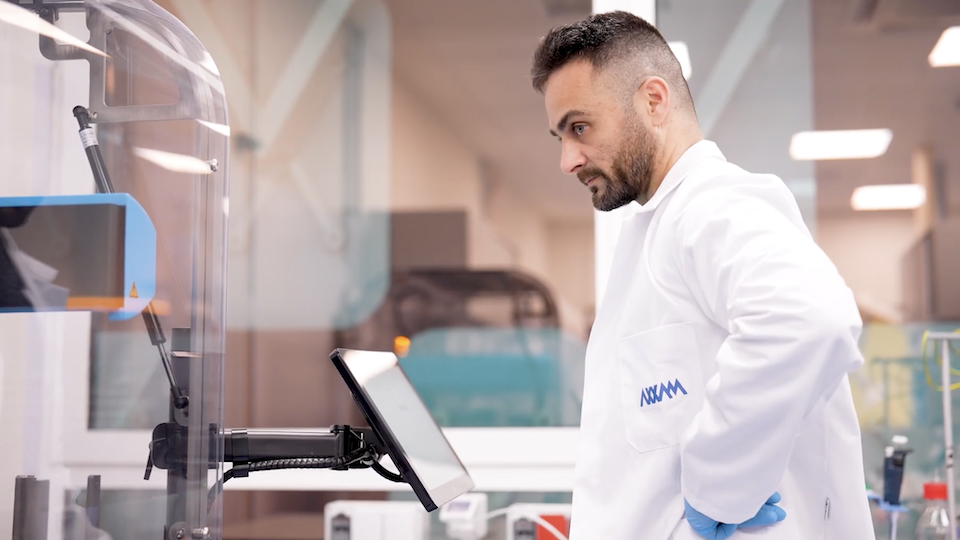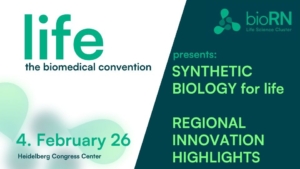
Clinical data meet preclinical validation: Axxam´s partnership with Molecular Health
That deserves a closer look: The recently announced partnership between Axxam S.p.A., a leading provider of integrated early discovery services, and Molecular Health GmbH, a pioneer in AI-powered data solutions for pharmaceutical R&D, is more than a standard collaboration. It exemplifies the convergence of consolidated in-vitro biology-led drug discovery with modern, data-intelligent drug development methodologies. As an example for breaking the silos of clinical and preclinical target validation.
A new collaboration bridges AI-driven target prediction with biological validation to accelerate therapeutic innovation. And perhaps ‘bridge’ is too modest – a ‘tunnel’ might be more fitting, as the Alps lie directly between Axxam (Milan, Italy) and Molecular Health (Heidelberg, Germany). The recently announced partnership between Axxam S.p.A., a leading provider of integrated early discovery services, and Molecular Health GmbH, a pioneer in AI-powered data solutions for pharmaceutical R&D, is more than a standard collaboration. It exemplifies the convergence of consolidated in-vitro biology-led drug discovery with modern, data-intelligent drug development methodologies. For end-to-end drug development support.
This alliance is surely worth following closely, as it reflects a forward-looking strategy that recognizes the power of building synergistic models in the age of artificial intelligence – an era in which machine learning is often expected to endlessly generate novel compounds. Yet for seasoned discovery experts, there remains one guiding principle: the proof of any new drug candidate lies in the clinical validation – the proverbial ‘proof in the pudding’. And clinical success is closely related to understanding biologic causalities.
This is the story of Axxam, based in Milan, which describes itself as a biology powerhouse. The company has now entered this strategic partnership with Molecular Health with the aim of accelerating the identification and validation of novel therapeutic targets across a wide range of disease areas. While similar alliances may have emerged in recent years, they reflect a broader industry trend: CROs upgrading their data infrastructure to deliver more compelling, evidence-based value propositions to clients. From Axxam’s standpoint, the collaboration represents a natural evolution in the ongoing pursuit of innovation through its integrated drug discovery model.
“Identifying the right target is one of the most critical and challenging steps in drug discovery,” said Ciriaco Maraschiello, CEO of Axxam. “This partnership brings together complementary capabilities – the predictive power of AI and the deep biological expertise necessary for validation – offering our clients a faster and more informed path toward clinical development.”
In an interview with European Biotechnology News, Maraschiello elaborated further on the thinking behind Axxam’s strategy to add more data-driven insight:
“The demand of clients changed, pharma and biotech companies are increasingly engaging external partners seeking collaborative thinking on target selection – particularly for complex or high-risk programs,” said Maraschiello. “About one year ago, we began exploring the use of generative intelligence, initially developing our own internal solution. But we quickly recognized that to move faster and more effectively, we needed a partner with complementary expertise. We were not just looking for assistance and support but for a true collaboration,” he added. “We tested three companies in providing ‘prompts’ to them and the answer of Molecular Health was far better than everything else we saw. Beyond a list of novel targets, this list was plausibilized for clinical relevance.” Why this was so important to Axxam’s strategy, Maraschiello explained: “We want to bring the clinical vision very early in the process. This means for Pharma simply going faster and going safer to the next milestones.”
From the perspective of Molecular Health, the collaboration offers a good opportunity to integrate its digital knowledge directly to preclinical development. This shall allow to seamlessly plan drug development programs coming from the end (approval) and integrate Molecular Health’s expertise into this novel end-to-end process. “While drug development success rates are still poor, the deep understanding of molecular causality of phenotypes is key to better therapies and development success,” said Friedrich von Bohlen, co-founder and CEO of Molecular Health. “Through this partnership, we are providing clients with a powerful combination of knowledge and expertise from disease to target to lead to therapy.”
At the core of Molecular Health’s platform is Dataome, a proprietary comprehensive and agnostic knowledge base integrating curated normalized molecular, clinical, phenotypic, and pharmacological datasets to derive causal relationships, accurate understanding and safety and efficacy predictions across all therapeutic areas and modalities. When combined with Axxam’s sophisticated biological tools – including iPSC-based disease models, high-content screening, and compound profiling – the outputs can be transformed into high-value leads already in clinical perspective.
“We were at the BIO in Boston recently,” von Bohlen told European Biotechnology News. “The pressure on Pharma from pricing and from China (much faster and cheaper drug development) is growing. And investors want to pick more successfully winners from the many investment opportunities. With DATAOME, our unique AI-able knowledge base we can do both: support Pharma companies to select the right drug candidates and develop them faster and with higher likelihood to succeed. And enable investors to identify the most promising companies and assets.”
A key differentiator of Dataome lies in its semantic and causal reasoning engine – linking target modulation with phenotypic outcomes – and its commitment to data provenance. Traceability and auditability are vital to both pharmaceutical partners and investors. Further, the platform’s multimodal integration extends beyond omics to include Real World Data and both structured and unstructured clinical datasets, providing early translational anchoring for target and biomarker hypotheses.
For Axxam, the inclusion of Dataome into its DiscoveryMAXX platform of integrated solutions from target to lead, strengthens the ability to move from AI-predicted targets to experimentally validated preclinical leads and further to clinical assets. “That’s exactly what we wanted to see,” said Maraschiello. “The integration of clinical data to all the omics data. Molecular Health starts with the patient from the clinic and brings us closer to causal correlation of all the molecular players in a disease.” He added that CROs will increasingly need to bring more data into the wet lab.
“AI companies can accelerate many aspects of drug discovery, but without experimental data and domain-specific insights, their outputs may lack the precision needed for effective decision-making. Another problem we have is, the clinical partners are still separated from the drug development, their data stick in silos,” Maraschiello added. Von Bohlen emphasized that the value of their database extends well beyond early target identification. “Many AI players generate large, opaque target sets with unclear translational value. Molecular Health focuses on quality over quantity, contextualised with clinical realities, disease mechanism alignment, and safety insights”, he stated. In addition to target validation, Molecular Health’s capabilities span indication finding and plausibilisation, biomarker discovery, safety profiling, trial eligibility modelling, endpoint prediction, and even the generation of digital molecular twins for simulation and predictive analysis of drug–disease interactions.
The collaboration already has its first pharmaceutical pilot project underway. “We already interacted with more pharma companies with our combined offering and get a lot of interest and traction,” said Maraschiello. “Our track record as Axxam is well known. We have successfully delivered leads that advanced to clinical trials, including at least five programs that already progressed to Phase 1 or 2 ̶ these are just a few examples we can mention, as many of our collaborations remain confidential. This gives us credit. Now, we even can make a difference to those other AI-companies with robust data. Molecular Health is enhancing our capabilities, and we are really enjoying working together.” Axxam currently employs around 155 staff and serves clients globally, with an even distribution across Europe and the US. With Molecular Health, the company is now positioned to deliver next-generation discovery solutions that blend clinical insight, artificial intelligence, and biological expertise.
This partnership is more than a conventional alliance between data and laboratory science. It may signal the rise of a hybrid interface – a convergence where intelligent systems and biological expertise co-evolve, bridging the final mile from computation to clinic. Or, to return to the metaphor: a sophisticated tunnel of data-driven insight, running beneath the terrain of biology-driven drug discovery.


 Freepik.com
Freepik.com
 Pixabay.com
Pixabay.com